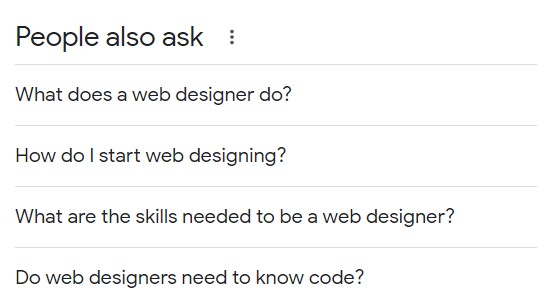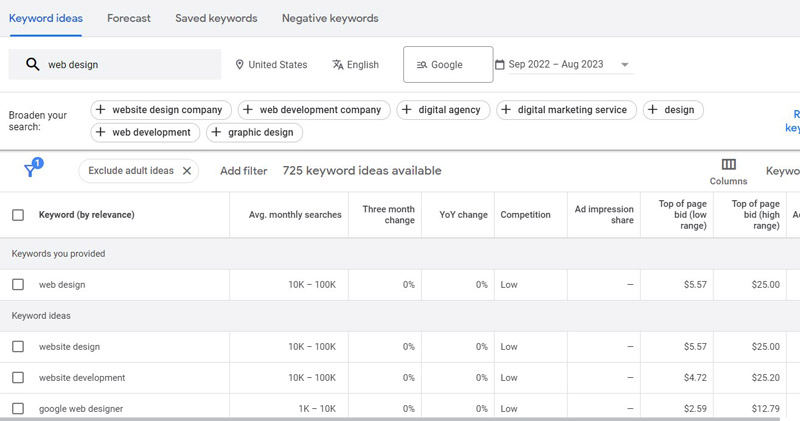Free Keyword Research Tools

This page may contain links to Amazon.com or other sites from which I may receive commission on purchases you make after clicking on such links. Read my full Disclosure Policy
My last post, Keyword Research: Getting Started, outlined the process for creating a list of keywords and phrases that might be used by people searching for what you offer on your website.
In this post, I’ll explain how you can use online tools to conduct further research and determine which of your keywords to focus on.
There are tons of keyword research tools out there, some costing hundreds of dollars per year. Don’t despair though – there’s a lot you can do without spending a dime.
Google Search
One of the best free keyword research tools is something you probably use every day: Google Search.
Simply Google your keywords and check the searches that Google suggest while you are typing. Those suggestions are actual phrases people have searched on.

Scroll down the search results page to see People Also Ask and Related Searches.


If you’re just getting started with keyword research, you might be inclined to focus on keywords which are broad in scope and have a high volume of monthly searches, such as coaching or productivity. Unfortunately, these short-tail keywords are highly competitive and usually dominated by larger businesses.
Instead, aim for more specific phrases, like productivity coach canada. Not only will there be fewer sites competing for traffic, but the searchers who land on your site are more likely to be in your target market and interested in what you offer.
Before you decide on your target keywords, pay attention to the search results they generate. This will show you what Google considers to be the best content to serve users who are searching for that keyword. If the content you’re planning doesn’t answer the search queries in a similar or better way than the sites that are currently ranking for your keyword, you should probably focus on a different one.
Google Trends
Google Trends can help you narrow down your list by determining which keywords are growing in popularity, making them a better choice than those which are trending downwards.
Google Keyword Planner
The Google Keyword Planner allows you to search the average number of times per month a keyword has been entered in Google search.

The other numbers refer to paid Google Ads but can provide some insight into which phrases advertisers are targeting in their ads.
Using the keyword planner, you can flag any keywords that have too little search volume to be valuable or too much search volume for you to compete. Don’t delete them from your list yet though – although they’re not a priority right now, you may want to revisit them in the future.
Keep in mind that the monthly search volume has little significance if competition for the keyword is too high or if your content doesn’t give people what they’re really searching for when they type in the keyword.
Once you understand what they’re looking for, make sure your content delivers it. This is called keyword intent, and there are four different types.
- Informational Search: Imagine someone isn’t feeling well and wants to find solutions. They might type in their symptoms to see what information is available.
- Navigational Search: While researching symptoms and treatments, the person might come across a brand that catches their interest. So, they type the brand’s name into a search bar to find their website.
- Investigational Search: When they start to read reviews and compare choices, they’re in the process of collecting information and investigating their options.
- Transactional Keywords: Transactional keywords usually include words like “buy” or “purchase” along with a description of what someone wants to buy. This type of search occurs when they’re ready to make a purchase.
Knowing the intent of the search will help you determine which keywords will help you to achieve a higher ranking.
Other Free Keyword Research Tools
Semrush is a powerful platform for managing SEO and other online marketing activities. Their paid plans are pretty pricey unless you’re using them extensively, but you can research 10 keywords per day, which may be all you need, with a free account. Even if you have a large website to optimize, you probably don’t have time in your busy schedule to work on more than 10 per day anyway!
I’ve used the free version of Semrush and found many of the tools included quite worthwhile. Read 11 Things You Can Do With a Free Semrush Account to see if there’s anything you’d find useful.
Like Semrush, Ahrefs offers both free and paid options. Unlike Semrush, you don’t have to sign up in order to use the keyword research and other free tools.
Check them both out, or if you’d rather learn more about each platform and choose the one that best suits your needs, read Ahrefs vs Semrush (2023): An In-Depth SEO Tool Comparison. According to the article, although there’s some overlap, they have enough unique features that many SEO pros use both platforms.
Next Step – Use your keywords
In my next post, you’ll learn how and where to use your keywords.
Photo by Sammby / DepositPhotos

Janet Barclay
I eliminate stress for my clients by hosting, monitoring, and maintaining their WordPress sites so they don’t have to worry about security, downtime or performance issues. When I’m away from my desk, I enjoy reading, photography, cooking, watching movies, drinking tea, and spending time with my family.




Well, I’ve been very poor at keyword research. I admit it. I’m sure it is part of the reason for my low search results. Time to get to work!
I hope the info in this series will be helpful to you.
Great tips on how to do Keyword research. Spending time once a month to gather the best keywords on your particular topic is essential to ensure you are writing relevant posts. I found that Google Trends isn’t as effective as the Google Search.
When looking up keyword phrases, also check the number of results that the keyword comes up in. It looks like “About 6,340,000,000 results (0.67 seconds).” This number will show you how many results came up with that keyword (I used “Home Organization.”
Also, if you perform well on Pinterest, try Pinterest Trends to get more information on different keywords. https://www.pinterest.com/trends/
Ooh, thank you for mentioning Pinterest Trends – I didn’t know about that, but it’s so easy to use! That link seems to be a user account but https://trends.pinterest.com/ should work.
Great info Janet, thanks for all the tips.
You’re very welcome, Janet!
I’m sad to say I’ve been so resistant to ever thinking about keywords or doing anything other than writing organically. It’s definitely a hangup, and I absolutely know you’re right. Thank you for always keeping us on the straight-and-narrow for best practices for things like this.
I’m looking forward to the next part of the series.
I think it’s especially hard for people who love to write to think this way. Admittedly, I haven’t used keyword research extensively myself, but it’s helpful to have a general awareness of how it works and to bear in mind the importance of keyword phrases as well as individual words.